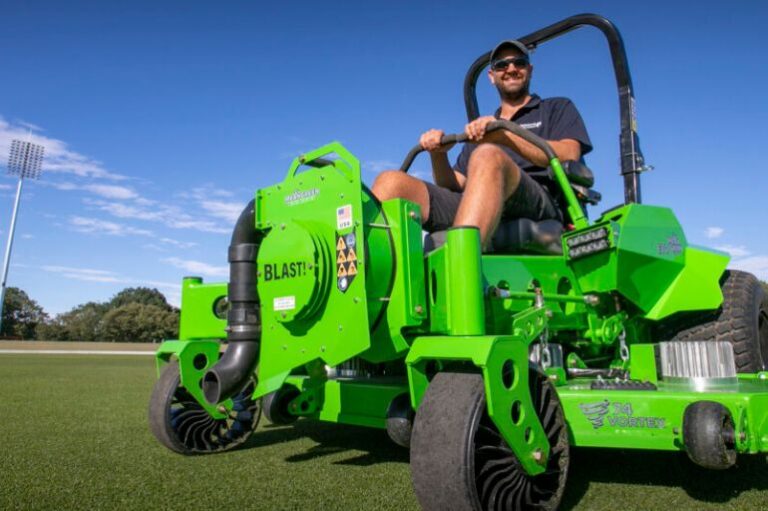Sustainability goals will remain just targets until governments mandate net-zero emissions. However, some local councils are taking the initiative, proactively transitioning their fleets to electric vehicles to meet ambitious carbon reduction objectives.
Christchurch City Council (CCC) is a leading example of how to successfully align fleet, maintenance, and infrastructure teams to achieve sustainability goals. From initial trials to full-scale adoption, CCC has demonstrated that sustainable practices and operational efficiency can coexist, setting a precedent for other councils to follow.
Transitioning to an Electric Fleet
The transition began when CCC’s parks maintenance contract was up for renewal. The parks team proposed bringing maintenance in-house, allowing them to invest in fit-for-purpose electric vehicles and machinery. With previous trials of electric mowers proving successful, the Council had the confidence to make the switch.
CCC invested in twenty-nine 60-inch and 74-inch electric mowers for routine parks maintenance while retaining larger diesel models for extensive mowing operations where electric alternatives were not yet available. The introduction of the EcoMow R96, a 96-inch commercial electric mower, has since provided a viable option for large-scale applications once diesel models reach the end of their life cycle.
Beyond mowers, CCC is also converting its passenger vehicles to electric and plans to phase out diesel utes over the next five years. Additionally, electric ride-share services have been introduced for short trips where feasible.
“Reducing carbon emissions is a priority, but lowering operating costs is equally important,” says Brendon Cowles, CCC’s Fleet Manager. “We’re ensuring electric equipment is fit for purpose before making the transition.”
The Cost Benefit of Going Electric
CCC’s ambitious goal of achieving carbon neutrality by 2030 is not just an environmental commitment but also a sound financial strategy.
“Petrol and diesel costs in New Zealand are high, significantly impacting our operations,” explains Rupert Bool, Parks Maintenance Manager. “We estimate fuel savings of NZ$600,000.”
Electric vehicles and equipment reduce expenditure on fuel, oil, and maintenance. Unlike diesel or petrol models, servicing electric alternatives is simpler, less frequent, and more cost-effective over their lifespan.
Infrastructure Upgrades and Challenges
Switching to electric equipment necessitated significant infrastructure investments. CCC commissioned an engineering report to assess power requirements, then installed additional charging points to support electric mowers, weed eaters, and blowers.
One key challenge was the inability to install charging stations in public car parks where many fleet vehicles are housed. The Council has addressed this by leveraging external transformers and developing a partnership with an electric ride-share company for shared charging solutions.
Training staff to safely charge and handle electric equipment was another priority, ensuring a seamless transition to new processes.
Operator Engagement: A Key to Success
Operator buy-in was critical to the transition’s success. Rather than mandating change, the Council engaged operators early, providing training and ensuring that new electric equipment met operational needs.
“We didn’t force change,” says Rupert. “Operators appreciate the lower noise and vibration levels, and feedback has been overwhelmingly positive.”
This approach fostered a sense of ownership among staff, helping drive the successful adoption of electric mowers.
Measurable Outcomes
The shift to electric equipment has yielded significant benefits:
- Quieter operations have improved public perception.
- Reduced emissions contribute to better air quality.
- Lower maintenance and fuel costs provide financial savings.
Older diesel mowers, which required frequent and costly repairs, have been largely phased out in favour of reliable electric alternatives.
Lessons for Other Councils
CCC’s experience provides valuable insights for other councils considering similar transitions:
- Start small and scale up: Trial electric technology before full adoption.
- Prioritise electric options: Diesel models now require strong business justification.
- Invest upfront for long-term savings: Higher initial costs lead to lower operating expenses.
- Secure internal buy-in: Engage operators early to ensure smooth adoption.
- Plan for infrastructure needs: Adequate power and charging points are essential.
These lessons have already inspired other New Zealand councils to explore electric solutions. CCC frequently fields enquiries from counterparts interested in making the switch.
Looking Ahead
With its successful transition to electric equipment, Christchurch City Council is setting the standard for local governments embracing sustainable solutions. As more councils make the shift, the path toward fully electric municipal fleets is becoming clearer than ever.






